
General Election 2024 – how will it impact mortgage rates
The general election is taking place on 4 July. Will a new government be the answer to mortgage-borrowers prayers or is the prospect of affordable repayments just a D:Ream? We found out…
‘Things can only get better’ was the (unintended) soundtrack to Rishi Sunak’s election announcement speech – and it’s a phrase to which most mortgage borrowers will nod in agreement.
Labour leader Keir Starmer has hailed the election as an opportunity for change. And, for those struggling to make their mortgage repayments or people worried about remortgaging to a more expensive deal, change would no doubt be most welcome.
But what could a change of government mean for your mortgage and finances? What effect might the election campaign have on the economy and interest rates?
We take a look at what mortgage experts think the general election and potential new administration will mean for homeowners and buyers.
How do general elections influence mortgages?
Mortgage prices are influenced by various factors but are strongly linked to the Bank of England’s base rate – or interest rates. Lenders also set their prices based on how the economy and the markets are faring too.
Nicholas Mendes, mortgage technical manager at John Charcol, said: “A general election in the UK can significantly impact mortgage rates, often indirectly, through its influence on economic conditions, investor confidence, and monetary policy decisions.
“During the run-up to an election, uncertainty about the future political landscape typically causes financial market fluctuations.
“This instability can prompt lenders to adopt a more cautious approach, potentially delaying significant rate reductions until the economic outlook becomes clearer.”
Will the election impact the next interest rate decisions?
The decision makers at the BoE, the Monetary Policy Committee (MPC), are due to meet next on 20 June to make their decision on interest rates.
They have remained at 5.25% since August 2023 and most experts believe the BoE will cut them in August. At the moment, it is thought they will remain at 5.25% in June – although it’s not a sure bet.
Could a general election change this?
It depends, says Mendes, on the new government’s finance policies. “A government adopting expansive fiscal policies might lead the Bank of England to raise interest rates to curb inflation, resulting in higher mortgage rates,” he said.
“Conversely, a government focused on austerity and reducing public debt might support lower interest rates, making mortgages more affordable.”
How will a change of government influence mortgage prices?
Mendes believes the policies of the winning party also play a crucial role in shaping mortgage rates themselves. Obviously, these are affected by the interest rates but there are other factors to consider.
“If the new government implements measures aimed at stimulating the housing market,” said Mendes, “such as tax incentives for homebuyers or reforms to mortgage regulations, it can influence lenders’ products.”
He used the example of how Rishi Sunak’s stamp duty holiday during the pandemic drove the first-time buyer market.
Basically, policies which encourage economic growth and stability generally lead to lower mortgage rates, according to Mendes, because lenders feel more secure in a robust economic environment.
Will a new era in politics improve housing?
Housing – or lack of it – is one of major challenges facing society. On top of the low supply of property there is a dire need for more support to help people buy their first home.
Laura Suter, AJ Bell personal finance director said: “The state of the housing market is a key concern for many Brits.
“First-time buyers will want to see an extension to support helping them get a foot on the ladder, while existing homeowners will hope for policies that moderate inflation and increase the likelihood of interest rate cuts.”
Meanwhile, Elliott Culley, director at Switch Mortgage Finance, speaking via the Newspage Agency, said: “Housing was not taken seriously under the recent conservative government. More than 15 housing minsters since 2010 has left the housing sector in ruin.
“If Labour does win they need to tackle the issues in the sector decisively. Now we are in to election season, let’s see what pledges are made. This will give us a steer as to how the economy will react.”
Source: Kate Saines of What Mortgage

Write a Comment